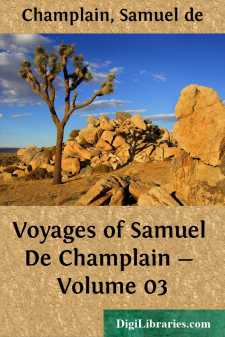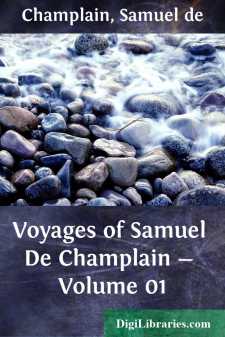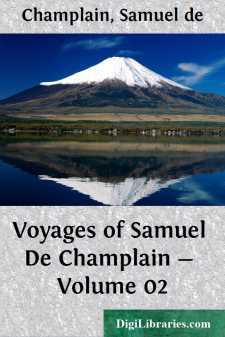Categories
- Antiques & Collectibles 13
- Architecture 36
- Art 48
- Bibles 22
- Biography & Autobiography 813
- Body, Mind & Spirit 142
- Business & Economics 28
- Children's Books 17
- Children's Fiction 14
- Computers 4
- Cooking 94
- Crafts & Hobbies 4
- Drama 346
- Education 46
- Family & Relationships 57
- Fiction 11829
- Games 19
- Gardening 17
- Health & Fitness 34
- History 1377
- House & Home 1
- Humor 147
- Juvenile Fiction 1873
- Juvenile Nonfiction 202
- Language Arts & Disciplines 88
- Law 16
- Literary Collections 686
- Literary Criticism 179
- Mathematics 13
- Medical 41
- Music 40
- Nature 179
- Non-Classifiable 1768
- Performing Arts 7
- Periodicals 1453
- Philosophy 64
- Photography 2
- Poetry 896
- Political Science 203
- Psychology 42
- Reference 154
- Religion 513
- Science 126
- Self-Help 84
- Social Science 81
- Sports & Recreation 34
- Study Aids 3
- Technology & Engineering 59
- Transportation 23
- Travel 463
- True Crime 29
Voyages of Samuel De Champlain - Volume 03
Categories:
Description:
Excerpt
CHAPTER I.
DEPARTURE FROM FRANCE TO RETURN TO NEW FRANCE.—THE DANGERS AND OTHER EVENTS WHICH OCCURRED UP TO THE TIME OF ARRIVAL AT THE SETTLEMENT.
We set out from Honfleur on the first day of March. The wind was favorable until the eighth, when we were opposed by a wind south-southwest and west-northwest, driving us as far as latitude 42°, without our being able to make a southing, so as to sail straight forward on our course. Accordingly after encountering several heavy winds, and being kept back by bad weather, we nevertheless, through great difficulty and hardship, and by sailing on different tacks, succeeded in arriving within eighty leagues of the Grand Bank, where the fresh fishery is carried on. Here we encountered ice thirty or forty fathoms high, or more, which led us to consider what course we ought to take, fearing that we might fall in with more during the night, or that the wind changing would drive us on to it. We also concluded that this would not be the last, since we had set out from France too early in the season. We sailed accordingly during that day with short sail, as near the wind as we could. When night came, the fog arose so thick and obscure that we could scarcely see the ship's length. About eleven o'clock at night, more ice was seen, which alarmed us. But through the energy of the sailors we avoided it. Supposing that we had passed all danger, we met with still more ice, which the sailors saw ahead of our vessel, but not until we were almost upon it. When all had committed themselves to God, having given up all hope of avoiding collision with this ice, which was already under our bowsprit, they cried to the helmsman to bear off; and this ice which was very extensive drove in such a manner that it passed by without striking our vessel, which stopped short, and remained as still as if it had never moved, to let it pass. Although the danger was over, our blood was not so quickly cooled, so great had been our fear, and we praised God for delivering us from so imminent a peril. This experience being over, we passed the same night two or three other masses of ice, not less dangerous than the former ones. There was at the same time a dripping fog, and it was so cold that we could scarcely get warm. The next day we met several other large and very high masses of ice, which, in the distance, looked like islands. We, however, avoided them all, and reached the Grand Bank, where we were detained by bad weather for the space of six days. The wind growing a little milder, and very favorable, we left the banks in latitude 44° 30', which was the farthest south we could go. After sailing some sixty leagues west-northwest, we saw a vessel coming down to make us out, but which afterwards wore off to the east-northeast, to avoid a large bank of ice, which covered the entire extent of our line of vision. Concluding that there was a passage through the middle of this great floe, which was divided into two parts, we entered, in pursuance of our course, between the two, and sailed some ten leagues without seeing anything, contrary to our conjecture of a fine passage through, until evening, when we found the floe closed up....




